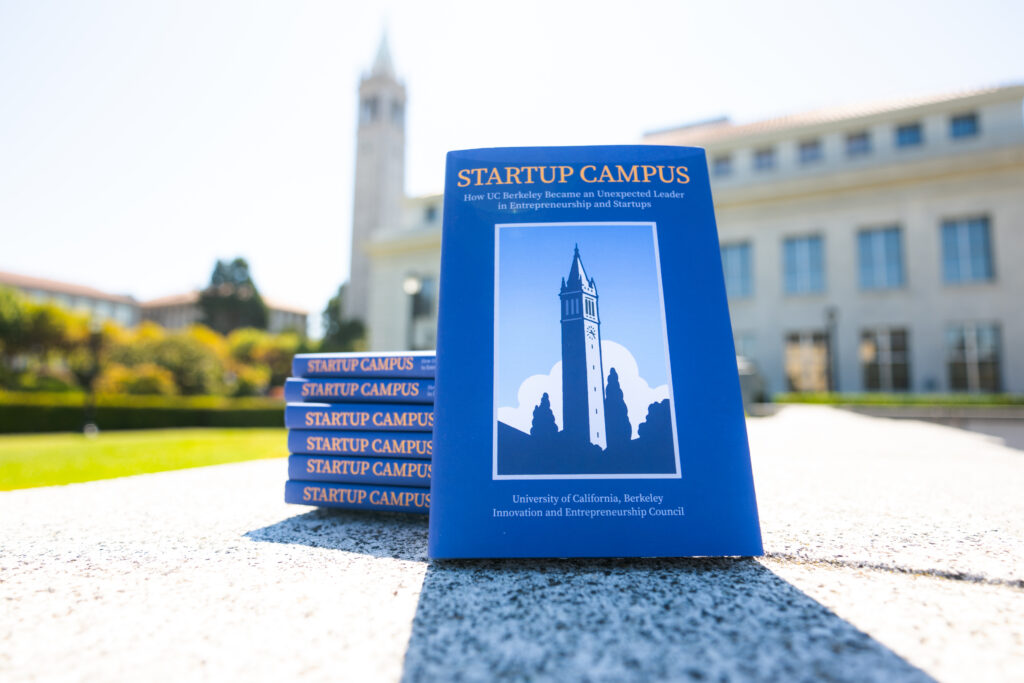Key takeaways
• Berkeley’s emergence as an entrepreneurship and startup leader was far from guaranteed.
• Startup Campus chronicles the campus’s entrepreneurial path, from the 1960s to today — and beyond.
• Students, faculty and staff can download the ebook for free (CalNet authentication required)
For over a year, Mike Alvarez Cohen had been studying UC Berkeley’s rise as a leader in entrepreneurship and startups. He compiled case studies of world-changing company founders and their startups. He assembled examples of how campus innovators built an ecosystem that encouraged big ideas and led to hundreds of new business ventures annually.
But in reviews of early drafts, a common argument emerged. People told him Berkeley’s success was inevitable given the campus’s proximity to Silicon Valley.
Cohen, the campus’s director of innovation ecosystem development, understood that viewpoint. He’d heard it before and didn’t completely disagree. But as the principal author working on a book about Berkeley’s innovation history, he wondered: Was it actually true?
 Mike Alvarez Cohen
Mike Alvarez Cohen
Brandon Sánchez Mejia/UC Berkeley
He found his answer in February while reading archival documents chronicling the evolution of college campuses in the 20th century. For most of Berkeley’s history, into the 1990s, the campus was openly apathetic — even hostile — to industry. Many Berkeley leaders and faculty viewed business collaborations with disdain, arguing it was inappropriate to profit from research initially paid for by taxpayers. Some even looked down on applied research.
It was only through focused, intentional changes and a gradual shift in culture that the campus recognized the value and became a leader in collaborations with industry, including startups.
In that moment, Cohen realized Berkeley’s rise to a startup powerhouse was anything but guaranteed. He had his hook — and subtitle — for the book he’d wanted to write for years.
Startup Campus: How UC Berkeley Became an Unexpected Leader in Entrepreneurship and Startups was published this month. The 214-page book stitches together the eras of Berkeley’s innovative history, from its early days of open hostility to its current place as a top-ranked institution for generating new ventures and startup leaders.
Free digital copies are available for students, faculty and staff. A new website invites people to share their startup stories. Additional events sharing the book and its stories are planned on campus throughout the semester.
“The publication is like a startup’s exit into an IPO or acquisition,” Cohen said. “It’s not the end of the journey, but it’s a culminating milestone.”
The book is broken into six chapters. Each chronicles a different phase of Berkeley’s innovation and entrepreneurship network, from the pockets of faculty in electrical engineering and computer science who initiated a culture of innovation in the 1960s to the complex web of programs and accelerators that grew in the 2010s and the next wave of collaborations today.
“Nearly 100 faculty, staff and alumni contributed to this story,” said Chancellor Rich Lyons, who wrote the book’s foreword. “It’s built on our research strength, our culture of questioning and our drive to make a difference. This is a new model for higher ed, one where scholars and entrepreneurs work together to scale impact for society.”
Speculative fiction to reality
Cohen initially workshopped a story idea about Berkeley’s innovation and entrepreneurship ecosystem in 2017 with Caroline Winnett, the executive director of Berkeley SkyDeck. Winnett even had a title: From Ivory Tower to IPO. But Cohen shelved the concept until a clearer story throughline and arc were apparent.
That time was right in late 2023. By then, Berkeley had established itself as a leader in innovation and entrepreneurship and was ranked No. 1 in venture-backed startups founded by undergraduate alumni. Meanwhile, campus culture, from leadership down, had embraced entrepreneurship — a far cry from the attitude just a few decades earlier.
The book’s emergence, like the rise of our startup campus, was anything but a solo effort.
Mike Alvarez Cohen
“Executive leadership wasn’t just supporting innovation and entrepreneurship,” Cohen said. “They were championing it.”
He emailed the pitch to Lyons, who was then the campus’s first innovation and entrepreneurship officer. Lyons wrote back quickly and enthusiastically envisioned a campus-wide effort.
By February 2024, the project was officially underway.
Laura Hassner, the campus’s executive director for innovation, entrepreneurship and the Berkeley Changemaker program, was also on Cohen’s initial email. She said the book project, which was made possible through the Project Tipping Point Fund, was ambitious — and necessary.
“We knew Berkeley was punching above our weight in innovation and entrepreneurship, and it was time for the world to know,” Hassner said. “With his deep knowledge of I&E and his experience as a published author, Mike was absolutely the right person to lead this donor-funded effort.”
 While Mike Alvarez Cohen (right) was the principal author of the book, he credited Laura Hassner (left) and Darren Cooke (center) with helping to make the book a reality.
While Mike Alvarez Cohen (right) was the principal author of the book, he credited Laura Hassner (left) and Darren Cooke (center) with helping to make the book a reality.
Brandon Sánchez Mejia/UC Berkeley
While this is Cohen’s first work of nonfiction, it’s not his first book. It’s not even his first book about UC Berkeley.
Under the pen name Singularitive Ranch, he’s written a four-part speculative fiction series involving Berkeley researchers, rogue experiments and future-shifting events. It’s a hobby he’s had for years that draws on his experience in Berkeley’s technology licensing office working with researchers and their innovations that have changed the world.
“This hobby taught me that the best stories are character-driven,” Cohen said. “So with this nonfiction UC Berkeley book, a big challenge was finding an arc for the story, especially without having one individual as the protagonist. Instead, the campus is the protagonist, and the arc is its unexpected journey to entrepreneurship excellence.”
Going from project launch to published book in 19 months is “atypical,” Cohen said. Especially considering he, Hassner and Darren Cooke, another key project supporter who serves as the campus’s interim chief innovation and entrepreneurship officer, weren’t working on the project full-time.
But Cohen said it was important to convey “our public university’s immense societal benefits to California, the nation and the planet, especially these days with all the scrutiny and skepticism about American higher education.”
Cohen said he views the book’s narrative sections, sidebar stories, program descriptions and chancellor’s foreword as a playbook for how other universities can think about melding teaching and research with innovation and societal benefit.
And while his name is listed as the principal author, Cohen said Startup Campus was only possible with the dozens of people who shared stories, edited drafts and pushed the book to publication.
“I’m particularly proud to have been a part of the team that wrote the story about part of what makes Berkeley special,” Cohen said. “The book’s emergence, like the rise of our startup campus, was anything but a solo effort.”

